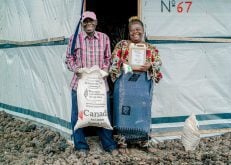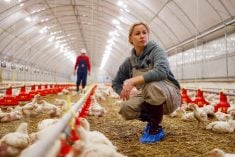SAO PAULO (Reuters) — The largest soy exporters in Brazil are waiting for a final payment offer from Monsanto Co. in exchange for collecting seed royalties from farmers, the chairman of crushing association Abiove said on Tuesday.
Reuters reported last month that a basic framework had been worked out in a dispute involving the world’s most powerful agro-business companies, and that at least one exporter had agreed to collect royalties for a fee.
Monsanto said in a statement on Oct. 23 that 500 companies had agreed to help police royalty payments in Brazil, an arrangement that highlights the increasingly complex relationship between grain merchants and biotech companies.
Read Also

B.C. ostriches culled, CFIA confirms
Ostriches on an embattled Edgewood, B.C. farm have been culled after a prolonged legal battle, the Canadian Food Inspection Agency has confirmed.
Abiove represents multinational companies such as Cargill Inc., Archer Daniels Midland Co., Bunge Ltd. and Louis Dreyfus Corp. in Brazil, the world’s largest soybean exporter.
The ball is now in Monsanto’s court to make good on the base agreement and negotiate individual payments with Abiove members, which account for some 85 percent of the soybeans bought in Brazil, Abiove Chairman Manoel Pereira told Reuters.
“What is missing is the most important part — the payment,” said Pereira, who is also director of grains at Minas Gerais-based trading firm Algar Agro.
He said none of Abiove’s members had received a payment offer and the association was trying to organize another meeting with Monsanto.
“We hope they don’t wait until harvest or it will be a problem,” he added.
Without compensation, Abiove members could refuse to buy soybeans grown from Monsanto’s pest-resistant Intacta RR2 pro soybeans, which should make up as much as a quarter of Brazil’s 2014-15 crop, expected to be more than 90 million tonnes.
An impasse could limit the soybeans Brazil has available for export in January, when harvesting starts.
The trading firms are wary of serving as a biotechnology police in Brazil, a role they have not had to play in the United States because biotech patents are protected by laws that do not allow farmers to reuse seeds year after year.
Some merchants had been collecting royalties on Monsanto’s first-generation Roundup Ready soy seeds in Brazil for a decade. That arrangement was a source of frustration as it required merchants to accept legal liability for their shipments, without any compensation from Monsanto.
Pereira said Abiove had worked out a framework that eliminated legal concerns over Monsanto halting shipments on cargoes containing soy for which it had not received royalty payments.
He declined to say what Abiove’s members considered a fair value for this service, adding that was up to individual companies.
A Monsanto spokeswoman said negotiations continued and the company was confident a solution would be found.
Brazil is Monsanto’s second-biggest market after the United States, making up a tenth of its US $15 billion in net sales last year. The company has blamed a downturn in royalty payments on its Roundup Ready products for a drop in net sales of soybean seeds last year.














